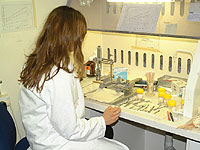|
|||||||||||||||||||||||||||||||||||||||||
| Drug Development - 7370 | |||||||||||||||||||||||||||||||||||||||||
The Graduate Certificate in Drug Development will be awarded to students who successfully complete the following course work. This program has similar format and objectives to the Graduate Diploma but is designed for those people who wish to obtain a limited competency in the areas described. The program is offered as a part time distance learning program and will take a minimum of one year to complete.
To fulfil the program requirements, students must satisfactorily complete four core courses, each worth 6 units of credit. Program Objectives and Graduate Attributes Learning Outcomes
Assessment will be based on the ability to apply principles to problem solving. There will be minimal emphasis on memorization of factual material. Both written exams and assignments will be based on scenarios i.e. case-type situations that require the exercise of comprehension, judgement, and an understanding of the issues involved. Education and Assessment Will be based on high-quality information delivery, application of this information through assignment work, and written examinations. This will form the platform for the assignment work that will be based mainly on the primary (i.e. research) literature. A key feature of assignment work will be development of critical appraisal skills for research papers. Students will also be issued with workbooks for each course that will set out assignment work and other tasks. This will be supported by the on-line learning system, Blackboard which provides all course information including assignment work, student questions and answers, chat rooms, etc. Students will study the manuals at their own pace within allocated time periods (nine weeks per course). There will be telephone tutorials for each course and two weekend workshops per Session. Tutors will be available for Q&A by email. Program Overview
The courses within the program start with a general overview of the drug development process, with a focus on drug discovery, chemistry relevant to drug discovery and development issues, pharmacokinetics and codes of practices and standards, and regulation of medicines in Australia. Significant attention is given to understanding the pharmacology and pharmacodynamic properties of drugs and how this relates to pharmacokinetics also. This is explored further in drug safety assessments leading up to the first human clinical testing. As the story of development of a drug from discovery through to human testing progresses in the program we deal with the important principles of clinical trial practice and management. This includes protocol development, obtaining regulatory and ethical approval, planning trial recruitment, data management and data reporting. The course closes with an introduction to the Law as it pertains to the development of new drugs. Emphasis is upon Administrative Law as it applies to the review of regulatory decisions provided by the Therapeutic Goods Act. The processes involved in the regulation of medicines, including prescription and non-prescription medicines, and medical devices within Australia are discussed in detail, along with the requirements of other international agencies. Year 1
Session 1 Session 2
Please refer to the Program Structure above and contact the school office for further information.
For information regarding fees for UNSW programs, please refer to the following website: https://my.unsw.edu.au/student/fees/FeesMainPage.html
|
|||||||||||||||||||||||||||||||||||||||||



